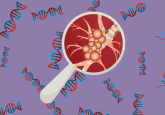AI clock reveals insights on aging, disease and therapy targets

Insilico Medicine (Insilico; Hong Kong, China), is a clinical stage end-to-end company specializing in AI-driven drug discovery, which integrates biology, chemistry and clinical trial analysis through advanced AI systems. Their AI platforms leverage deep generative models, reinforcement learning, transformers and other cutting edge machine learning techniques to identify new targets and generate unique molecular structures with specific properties.
Insilico has recently announced a new multimodal transformer-based aging clock named Precious1GPT. This advanced system efficiently analyzes diverse data sets, offering valuable insights into aging biomarkers. It maps these biomarkers to genes associated with both aging and disease, leading to the discovery of novel therapeutic targets aimed at slowing down or even reversing aging and aging-related diseases. The name Precious1GPT pays homage to the formidable ‘One Ring’ from the Lord of the Rings saga. The study’s findings were published in the journal Aging.
Insilico has been a pioneer in the fields of generative AI and aging research with their contributions dating back to 2014, when they published studies on aging biomarkers through advanced bioinformatics. Subsequently, the company utilized deep neural networks (DNNs) to train on longitudinal human ‘multi-omics’ data, further retraining them on diseases. This led to the development of their comprehensive Pharma.AI platform, which covers target discovery, drug design and clinical trial prediction in an end-to-end manner.
The advent of transformer-based neural networks, such as the one used for Precious1GPT, is a relatively recent development. Initially, researchers pre-train algorithms using unlabeled data, followed by refining them with smaller sets of labeled data. Multimodal transformer models exhibit the capability to handle diverse data types, encompassing genomic, proteomic, microscopy, computational chemistry and clinical imaging data.
Alex Zhavoronkov, founder and CEO of Insilico Medicine and the study’s corresponding author stated: “We have long used DNNs to better understand human disease and aging biology. Now, with great advancements in generative AI capabilities, including AI-based transformers, we are able to further accelerate this process to make an aging clock that can not only identify where aging and disease intersect but connect that information to actionable therapeutic targets.”
In this study, the research team employed the Precious1GPT method, which utilizes a multimodal transformer-based regressor trained on diverse datasets, including RNA sequencing and epigenetics methylation. The goal was to predict age and identify genes that play crucial roles in both aging and diseases. The multimodal transformer exhibited the ability to accurately predict biological age and distinguish between disease and control samples.
The team then inputted the identified gene lists into Insilico’s AI target identification engine, PandaOmics, leading to the discovery of targets strongly associated with four age-related diseases: idiopathic pulmonary fibrosis, chronic obstructive pulmonary disease, Parkinson’s disease and heart failure. APLNR and IL23R emerged as potential targets for the delay and treatment of age-related diseases.
The scientists at Insilico aim to enhance this method by utilizing it by applying it to larger datasets specific to various diseases where they will then validate their discoveries through laboratory experiments. Their ultimate goal is to employ this technique in gaining deeper insights into the molecular processes of aging and creating novel interventions for both aging and aging-related diseases.
Frank Pun, Head of Insilico’s Hong Kong Office and co-author of the study commented: “Applying generative biology to aging and disease using a transformer-based approach gives us new insight into how these complex biological processes interact and clues as to how we can slow or reverse their progress through new therapeutic approaches.”
The results will be showcased at the forthcoming Aging Research and Drug Discovery conference in Copenhagen, Denmark, which is celebrating its 10th anniversary. This conference serves as the leading gathering of esteemed academic and industry pioneers dedicated to advancing research, commercialization and investment in the fields of aging and long life.





